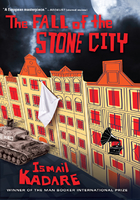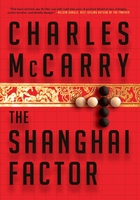NO ONE WOULD BE MORE ANNOYED THAN DAVY IF I TRIED TO RECAST THE predicament under some redemptive glow. Two boys were dead in our house and there was no bright side to the matter. I recall Davy sitting on the basement stairs under a yellow bulb, jacket dragged on over his T-shirt, his face oily with rain. He wouldn't speak and his eyes showed a narcosis that was fearful to me. We waited together for Ted Pullet to arrive. Dad, far gone in prayer, held Swede in one arm and gripped Davy's shoulder with the other. I recall a sensation of splitting in two, of becoming smaller. I babbled to Davy that it would be all right, that he had not meant to do it.
Which woke him from wherever he'd been, for he turned and snared my wrist. "Don't say it's all right, Rube, don't say it. I meant to do it. I meant to. You hear me?" I could only nod frantically. Cars had driven up while he spoke, and we heard doors thumping and voices and saw red lights bouncing off the windows.
Davy said, "Here we go then."
He was always impatient with our family's general insistence that things turn out for the best.
True story: In the spring of Dad's twenty-eighth year, he was raised up by a tornado, along with most of the roof above him and a few loose boards he was setting into the floor.
This was when he was married to my mother, attending a little school in Iowa under the GI Bill. In those days Dad's love of books and scholarly quest kept him happily consumed—he was one of those honorably ambitious self-educated men loved by American folklorists, a Lincoln-hearted reader who might walk ten miles to borrow a volume of poetry by John Donne or a novel by Melville or, to be particularly honest about it, Owen Wister. Loving to study and possessed of unusual compassion he leaned naturally toward medicine, and I imagine my mother falling easily for this generous and handsome and obviously rising young man. (To this day, in fact, it is easy for me to conjure the look our lives might've had, if Dad had but held course: an unassuming farmhouse with a wide-swept porch, surrounded, I'm guessing, by a few head of Angus beef on a pastoral acreage, because a doctor needs his recreation, a couple good quarter horses in a painted corral, Mom coming out the back door slapping flour off her apron, calling us kids for supper, looking pleased and content. Surprising, isn't it, how close such pictures lie beneath the surface?)
From what I heard those were fine times. Davy was a year old and tottered roguishly around the gladhearted poverty of marriedstudent housing; Mother fed him and wore thin from the chase and read him to sleep from Robert Louis Stevenson. Dad studied the bones of the science department's hanging skeleton, name of Yorick, a short scurvied fellow gone the color of weak tea. A professor of Dad's told him Yorick was no conscientious volunteer but was instead a hard-luck Calcuttan who'd been dredged from the Ganges River and been boiled clean and had ridden the black market to the American Midwest. It made a person think. When not studying, Dad worked, sweeping and painting in the athletic building twenty hours a week, unknowingly getting all the education he was going to need right there in his coveralls. It was the athletic building, Dewey Hall, that the tornado struck, just past eleven one heatsoaked night in September. This, by the way, is the only story Dad ever told us in whispers: how the tornado came cruising up out of the south, birthed from a yellow cloud; how it touched earth at the fringe of town, a pale umbilical rope, to corkscrew almost shyly up College Drive, gathering dirt but little else. Next morning the first thing emergent residents noticed was their street, swept like never before, and all streetside grass combed and pointed as if in praise to some passing magnificence.
Dad was working late, installing new floorboards on the basketball court where a light fixture had fallen the previous winter—it just worked loose and fell, interrupting a home game, injuring no one but thrilling the crowd with its descent and powdery detonation. Dewey Hall was the only building on campus not made of brick, and the tornado came for it in absolute maturity, no umbilical growth now but a strong slender lady hip-walking through campus—past the science hall, past English, jumping Old Main and the library with deliberate grace and lighting on the shallow roof of Dewey, where Dad toiled alone. He said it didn't sound like a train, as the wisdom goes, but like a whole mountain breaking loose and skidding sideways over the ground, and looking up he saw shingles in the air, and bits of skylight glass hovering in slow circles; he saw incandescent fixtures likewise floating, torn from their sockets yet their filaments whole and gloriously charged by some storm-bent physics; and as he sprang for the basement steps—not fifty feet away—he heard the great slab of ceiling tear loose and felt himself move upward, ascending in bodily confusion out of the range of gravity and earth and earthly help.
Meantime my mother, awakened in their third-floor garret by the hissing wind, leapt up in time to see the rotating head of the funnel coast overhead, lit municipally from below. Gusts of sand raked the panes. No accumulation of hard feelings can diminish my admiration for what she did then, which was to fly nightgowned into Davy's tiny room, seize a folded quilt, and brace it against his window. Thus she stood while the noise rose from a hiss to a many-noted baying; thus she stood as all lights failed and glass burst elsewhere in the building and the noise became everything a mind could hold.
As Dad told the story this was always the moment of triumph, the turn of the war toward winning: Mother is leaning against the window, standing between the gale and little Davy, and at the storm's very crest, when it is like a war come seeking what it might devour, she feels the slightest easing in the glass. At the same time Davy stirs and smacks, he rolls to his stomach, the glass goes still beneath her hands, and by the time Davy's settled back into sleep, the war's moved on, to the north.
(But do you think the worst is over? Remember, Dad is only now on the ascent—hammer in hand, he's peeking at eternity—Mom's tears of relief are just standing at the corners of her eyes. Nope, the worst, for Mom at least, is still to come.)
First thing she did, Dad told us, after the storm moved on, was to run out groping for the hall telephone they shared with the third floor. To ring up Dewey, of course—to check on Dad. The line was dead, no surprise, but a strange thing; the handset was hot. Not warm as if from someone's hand but hot, charged, voltage-goosed. Mother had it to her ear before her palm registered pain. Later she would say the scorched phone scared her more than the storm. It seemed outside of nature. It foretold evil. Dropping it, she felt her way back and pulled Davy from his crib and held him for comfort. I imagine them at the window she'd stood braced against, looking across campus, but you couldn't see Dewey Hall from there, the lights were still out, and anyhow Old Main stood up between them.
Within the hour, someone knocked. In the dark, wrapped in a robe, Mother opened the door to a small committee of men, their lanternlit faces the color of burning paper. The man in front said, "Mrs. Land, Dewey Hall is down."
And there it was: the worst. She heard them out, their descriptions of the torn building, the void where the roof had been, the twists of painted siding and electrical wire and ruinous plankage spread northward in a long littered swath. They'd taken lanterns and hoisted wreckage and found no sign of Mr. Land. Others were searching even now. They needn't have told my mother she should prepare for still harder tidings, but they were clumsy fellows and no doubt completely at sea. Was there a right way to deliver the sort of news they carried?
As to my mother's state of mind in those next hours, I can only guess. Once in my life I knew a grief so hard I could actually hear it inside, scraping at the lining of my stomach, an audible ache, dredging with hooks as rivers are dredged when someone's been missing too long. I have to think my mother felt something like that. Maybe Davy woke and distracted her; maybe she was numb; maybe she had the reserves to begin planning even then how best to make her way in a world that had been so friendly only the night before. All I know for sure, from Dad's telling, is this: She was at the kitchen table late that morning, having dressed and fed Davy and set him to riding his reined footstool, when the hall phone, restored to service, began to ring. She sat a long while, wanting someone else to get it, but the whole floor had emptied, gone to class and to work and to walk blinking round the former Dewey Hall. At last she got up and answered. A woman asked for Mrs. Jeremiah Land.
"Speaking," said my mother.
"Did your car survive the storm, Mrs. Land?" the woman asked.
My mother said, sharply, "What are you talking about!" Be patient with her, now; think of her long night.
"Mrs. Land," the woman said, "I'm Marianne Evans. Our farm is four miles north of town. I got a man here drinking coffee on my porch. He says he's your husband."
Well, we all hold history differently inside us. For Swede such episodes retold themselves into a seamless and momentous narrative; she had a Homeric grasp on the significance of events, and still does; one of her recent letters asks, Is it hubris to believe we all live epics? (Perhaps it is, but I suspect she's not actually counting on me for an answer.) Dad, he himself would say, was baptized by that tornado into a life of new ambitions—interpreted by many, including my mother, as a life of no ambitions. Finishing out that semester, he moved his family off campus and found work as a plumber's assistant. This was the anticlimactic denouement to his whispered tornado story: Having been whisked through four miles of debris-cluttered sky, having been swallowed by the wrath of God and been kept not just safe but unbruised inside it, having been awakened midmorning in a fallow field by a face-licking retriever—Dad's response was to leave his prosperous track and plunge his hands joyfully into the sewer. An explanation is beyond me other than to repeat what he would often say, the story ended, his hands tucking up the blankets, "I was treated so gently up there, kids."
But the whole thing bothered Davy, and with Dad out of earshot he'd say so. You couldn't get blown around in a tornado, he said, and not get banged up. It didn't make sense. It wasn't right.
Swede challenged him. "Are you calling Dad a liar?"
"Of course not. I know it happened. It just shouldn't have. Don't you see that?"
"No," Swede replied.
But I saw what he meant, or I would eventually. Davy wanted life to be something you did on your own; the whole idea of a protective, fatherly God annoyed him. I would understand this better in years to come but never subscribe to it, for I was weak and knew it. I hadn't the strength or the instincts of my immigrant forebears. The weak must bank on mercy—without which, after all, I wouldn't have lasted fifteen minutes. History simply hadn't equipped me as it had Davy. You had only to look at his hands to see it: His hands were hard as any man's, and quick—quick as eyesight. They moved always as with a purpose long known. History was built into Davy so thoroughly he could never see how it owned him.
And Mom? I can only believe she sat down and wept, after that phone call, as any loving wife might do. How she must have rejoiced, how frantically she must've driven to the Evans farm—and the clasping and shuddering of that reunion must've been a thing Marianne Evans would tell her neighbors about and remember in her heart on rainy evenings while her husband worked in the barn. Happily for Marianne, she would not see the changes that tornado wrought. She wouldn't see my mother's puzzlement as Dad surrendered his studies and his prosperous future; nor my mother's attempts to make the best of it. These attempts lasted quite awhile, really—long enough to bear Swede and me—but she must've felt Dad had violated some part of the covenant between them. She departed without explanation or epilogue. We heard, later, that she married a doctor after all, in Chicago, an older gentleman whose first wife had died; we heard they patronized the symphony and the theater and enjoyed choice memberships. But none of this did we hear from Mother, for no letter or call did we once receive; nor did we ever meet the gentleman on whose behalf we'd been erased.
They put Davy in cuffs and drove him to the Montrose jail and the rest of us to a motel for the night. Easing away through the rain we saw an ambulance backed onto the lawn, a deputy stooped smoking on the porch, and the freeze and fade of windows struck with camera flash.
The whole thing was no less a tornado than the other.
Next day when we went to see Davy, Swede tried to kick him. She was crying and incensed and he reached to comfort her, and she gave it a stout try between the bars, only to clank her shin.
"Good grief, it's lucky I'm in here," Davy remarked, as Swede hopped about, biting her lip. Grim as it was, I could see Dad was glad for the joke. Davy'd shaken off the concussed glaze of the night before. He was in a little cell with tan lighting and squashed flies on the wall, but he'd not grown fangs or become a creature changed beyond knowing. When Swede had got the mad out and hugged Davy through the bars, Dad told us to say goodbye and wait for him in the hall.
That was the hardest thing—going out that door. It was so thick and closed so heavily we couldn't eavesdrop through it, not even with the paper cup Swede swiped from the watercooler.
Dad was quiet when he joined us. We walked out to the car, the wind flapping staleness off our clothes.
"He seems all right, doesn't he?" I said.
"Sure he does," Dad replied.
It seemed a long ride home. We got there at suppertime, and Swede and I looked around in the cupboards. Normally Dad would've taken over and worked up some meal or other, or at least suggested that Swede and I do it, but instead he just sat in a kitchen chair and leaned back shuteyed.
Thinking of supper, I asked, "You want us to do anything, Dad?"
"Persevere," he said.
* * *
It was a better answer than we wanted. What else to do when the landscape changes? When all mirrors tilt? That first week Swede rose as usual and demanded that I help her cook Dad's oatmeal, but he could no more eat it than he could wave and run for Congress.
Suddenly, lots of people we didn't know were calling and dropping by. Reporters, yes: an apologetic writer from the county weekly in Montrose, a sad-mouthed fellow from the Star in Minneapolis, two different radio men, slumpshouldered from their big reel-to-reels, and the first TV correspondent ever sighted locally, which merited an article and photo of its own in the Montrose Observer. We also heard from certain bold and ambitious lawyers who'd read the early accounts and, for some reason, from a slew of young women who'd seen Davy's tragic mug in the news and imagined him misunderstood.
Meantime, a lot of people we did know, and whose cheerful encouragement I'll bet Dad could've used, were staying away. A few examples? How about Harold Barkus, the gas and oil man who did all the repairs on our aging Plymouth, who once came to Dad drunk and weeping after his wife had left, and drooled a quart into our couch that night as he slept, and left next morning sober and galvanized, with a hot breakfast in him—Harold Barkus wouldn't even fill our gas tank anymore, instead sending his gangly boy out to do it. Through plate glass we could see Harold, sitting in his office, not looking out.
How about Leroy Biersten, the principal of the school, who'd hired Dad and who'd sat grieving at our table when his daughter turned up pregnant by a fled serviceman? Do you suppose Leroy could think of a word of comfort?
Maybe it was fear, I don't know; maybe embarrassment. Maybe these people put themselves in Dad's place, figuring they'd wish for no one to say a word if their son had shot down two boys; if it were their son sitting all day all night in that courthouse cell.
Or maybe—could this be?—they just reasoned Dad was due some grief. That a man like him couldn't be exactly what he seemed. Perhaps it relieved their anxious souls that the clock ran against Jeremiah Land as it ran against them all.
I think of Oscar Larson, who liked to take Dad fishing because it seemed the walleyes always gathered round when Dad was in the boat. And of Gary Sweet, the butcher, whose walk-in freezer Dad had fixed during the July hot spell the previous summer, saving the integrity of uncounted beeves. I think of Ron Simonson, the odd-jobs man, who could count on Dad for occasional work—sharpening mower blades, shingling the garage, doing such tasks as Dad would've been delighted to do himself had Ron not needed employment. And I think, can't help it, of those friends of Job's in the Old Testament, the men who came to Job as he lay there in his bed of ashes, all twisted with boils and the loss of his children, and said to him, Now what did you go and do?
Of course vindictiveness is an ugly trait and, yes, I do mean to forgive all these nice deserters; I mean, eventually, to say, to their ghosts if not their living faces, It's all right. I understand. I might've done the same.
Not yet, though. Let me bear witness first.
Two men I remember who did not desert—no, three. They were the Methodist preacher James Reach, and Dr. Animas Nokes, and also Mr. Layton, first name of Gerard, the dimestore man who'd been struck of the spirit at the hand of Reverend Johnny Latt. Reach and Layton and Nokes: these three.
Strangely, it was Dad who seemed to suffer most, and Dad whom these few rallied round, while Davy—who had aimed and fired, aimed and fired, aimed and fired—Davy sat suspended on a county bench and seemed on the whole the same boy who'd always been my favored brother. Though some thinner; he didn't eat much in there. I remember a moment when he rose from his seat against the cinderblock and put his arms around me through the bars, and I put mine around his narrow waist. Then I saw how dark he was beneath his chin, and how his skin looked rough and loose like a much older man's. He grinned and wouldn't let me cry. "Say, Natty"—his hands strong upon my shoulders—"don't you eat those geese yet. You keep those in the deepfreeze till I get out. Just a little while." At this I recall a stirring of the jailer who stood close by, a fleeting chuckle of his keys as if at Davy's words, till I get out; a little while. But I held my eyes on Davy's and saw a thing that jailer couldn't: I saw the shine of certainty, of faith, of some knowledge inside my brother; and I knew in whom I could believe.
But if Davy didn't get much reassurance in person—and you know, even Dolly didn't go see him, not right away—he surely did get it through the mail. Especially those first days, when the newspapers leaned graciously in his direction. Not the Montrose Observer, which still had the Finch and Basca families to live beside and so took an almost ludicrous care with the story; but the Minneapolis daily's first few headlines were the stuff of scrapbooks. TEENAGE SON DEFENDS HOME AND FAMILY. HELD WITHOUT BAIL AT SIXTEEN—DAVY LAND JAILED FOR SHOOTING ASSAILANTS. DAVY'S SISTER: "HE SAVED MY LIFE." (This last was a triumph for the solemn fellow from the Star, who sat at a distance watching our house until Dad went into the backyard to rake; the reporter then sprinted to a phone booth, Clark Kentlike, dialed our number, and by pure good manners got a sentence or two out of Swede before Dad, hearing her voice through the screened windows, returned, rightfully suspicious.)
These stories lit fuses under an astonishing number of folks. They wrote letters as if impelled by nature; as if Davy embodied whatever it was they'd thought long-lost and wanted back.
Dear Davy Land,
In this Godless day of corrupt youth and permissiveness toward criminals it is reassuring to see a young man stand up in defense of hearth and home. That you are reading this in jail is no surprise to me but instead a sorrowful commentary on the way we treat those who dare to do what is right. Lest you begin to doubt yourself let me reassure you. Those fellows who broke into your house were cast from evil molds, they had in mind to hurt and kill, and they reaped what they had thought to sow. Your bravery gives us all new hearts,
Sincerely
Dear Davy,
I'm a widow (young) whose good husband died two months before our house was broke into by a bad boy from the neighborhood. Often I have wondered what my husband would of done had he been here and now I think I know. He was a strong man. He had eyes remindful of your own, as struck me when I saw your picture. I am sorry for you to be where you are right now but am praying for you daily. Will there be a trial? I am enclosing a recent photograph of myself.
Warm regards
So many letters came those first two weeks that one of the deputies, Walt Stockard, who'd managed to father four restive daughters before his twenty-seventh birthday, brought in a shoe box to hold them all. The shoe box was festooned with pink ribbons and all manner of brocade and peppermint swirls laid on with crayons, so that it looked like it ought to hold valentines; every day Stockard would replenish the box from that morning's post and in slow hours would pull up a chair and prop his boots on the bars, dipping into the mail and reading aloud. "Here's one from a Maggie in St. Paul.
"Dear Davy,
I am in the ninth grade at Washington School, we have just begun to read William Shakespeare, our teacher Mr. Willis demands we read Julius Caesar even though he knows it is Romeo and Juliet we all desire. I hope you will write back, I would like to have a pen pal, maybe we could tell each other our thoughts, I am only fourteen but everyone says I am mature for my age.
"And say, Davy—it's got perfume on it."
None of this was comforting to Dad, however. There arrived a day when the phone budged into our dinner-table quietude, informing us that Davy would be charged with two counts of manslaughter—that charge instead of murder because of Davy's age and because the victims had entered the house bent on mischief. "Mischief?" Swede said. "Mischief?"
I knew what she meant. Mischief was the word Dad used when we ventured into the timber with a hatful of firecrackers, meaning to explode cowpies. In fact we were now beset with a whole lexicon of legal applesauce; Swede and I eavesdropped on a man in a beard and a tan baggy suit who sat at the table drinking the coffee Dad so tiredly poured, the two of them talking in quiet voices about jury selection and presumption of innocence and change of venue, this plea and that plea, bail reductions, and judicial prejudices against violent youth. Salient to me in the visit of the bearded man was not so much his language as his expression, which was wise, guarded, and unencouraged by encountered fact. "Judge Raster lost his wife last summer," he told Dad. "It has not made him soft." And from this grave disclosure I drew my picture of Judge Raster; a blackrobed hulk, face like a shark's, noose clutched behind his back.
The bearded man, Dad told us next day, was Thomas DeCuellar. He was Davy's defense attorney, appointed by the state. We knew he was a good man because he was on our side and had twenty years' experience in various courts of law, and because he'd brought with him, from his wife, a quart jar of dill pickles she had put up herself, with cloves of bluish garlic and, DeCuellar said, somewhere in there, a jalape?o pepper.
Days came, went. Davy sat; reporters left town in search of new misfortunes; the strange mail dropped off. One morning Swede didn't come out of her room and foiled my snoopish concern by propping a chair beneath her doorknob. "I'm working," she declared. "Don't bother me."
Her tight-throated resolve gave me new wells of unease to plumb. "Working on what?"
"Isn't your business."
She was writing, of course; I could hear the whir of the typewriter carriage as she rolled in a sheet. The fact made me nervous in some abstruse way. What I wanted was for Swede to be Swede: that is, glad and funny and belonging to me, as usual. We'd always been an exclusive pair, she being smart enough for the two of us and never begrudging me her secrets.
"Is it Sunny Sundown?" I asked—sounding, I know, like some dumb jealous boyfriend, but all the same you should've heard the passion she was pouring on those keys.
She didn't answer, so I moped away to the kitchen to eat cornflakes in solitude. Dad was back at work by now, having taken leave after the shootings, and by rights we ought to've been back in school; but Dad, though a believer in education, had never respected the glowing objective of perfect attendance (a goal set for kids, he said, "by adults with ruined imaginations"). Before returning to his job, he'd sat down with Swede and me and asked if we felt ready to undertake classes and sociability again, or whether we'd like another week at home.
What do you think we were, idiots?
Besides, I suspect Dad didn't want us back in school yet. He was weathering quite a gale there himself, though we didn't know it; Superintendent Holgren, first name of Chester, a man whose face was a minefield of red boils, had decided to "scour that janitor's teeth" (his precise words, as told to me later by the daughter of a school board member who'd invited heinous old Chester over for rolls and gossip). I will give you an example of such scouring. Remember how, the night Finch and Basca broke in, the rain changed to snow? Well, it snowed two inches before changing back to rain the next morning, and the rain came cold and steady for some days thereafter, so that the gutters of Roofing ran with brown water, and runoff from the railroad grade sated the yards of trackside residents, and the boulevard maples and elms grew rank and black, their limbs swooning. Had the city been more carefully engineered—had the storm sewers been of greater capacity or the school been built on higher ground—this would've been harmless enough. And yet on Saturday afternoon, two days before Dad returned to work, the sewer system came full. It was stuffed! Squatting on its low plot the school became a living illustration of the properties of water, which, as you know, seeks its own level. How much detail do you need? How much can you stand? I'll spare you beyond saying that when Dad got to school Monday morning he encountered a basement shin deep in evil, a swamp of soft terrors afloat and submerged, a furnace choked and dead, a smell to poise your wits for flight.
Superintendent Holgren called off school, of course.
But do you think he called a plumber?
The first two days, Dad didn't even come home. He telephoned to ask that I bring him a sandwich and a clean shirt; his voice betrayed the headache that had been riding him all week. When we reached the school Dad met us at the top of the basement steps. His hands were clean but you ought've seen his clothes. He tried leading us away but we looked past him and beheld what he was up against. Did you know that air can have a taste?
"Where's Mr. Ringman?" Swede asked suspiciously. Mr. Ringman was "second janitor," meaning he didn't have as many keys as Dad.
"Well, he left."
"Couldn't you come home?" I asked. "Mr. Ringman gets to go home."
Dad said, "Mr. Ringman quit." Boy, his expression was hard to read. Then, "Swede, it's all right. Don't, now," because she'd teared up and was leaning toward him, about to fling her arms round his waist. He glanced at me, alarmed; did I mention his clothes? So up I stepped and Swede laid her head against my chest to cry while I held ungracefully on to her, and Dad's washed hands smoothed her hair and shielded her face and blessed her, it seemed to me, against all coming trouble.
Of note, I think, is that Roofing Elementary actually had a contract with a pipe-and-furnace man in Montrose in order to deal with just such catastrophes. His name was Jack Benedict and he was accompanied always by a big and fractionally tamed raccoon, Roach, who would tangle his leash around your ankles and then bite you when you tried to unwrap him. Jack Benedict had paid many a slippery visit to Roofing Elementary, including the time Roger Capps, who would later join the army and die falling out of a helicopter, snagged his teacher's wig off her head in a fire drill and zigzagged with it through the crowded hall, finding sanctuary in the boys' washroom, whence was heard the inevitable flush. Not to lose my point here: The school had no compunction about calling on Jack Benedict until Superintendent Holgren decided Dad's teeth needed scouring.
As far as I was concerned, Mr. Ringman had the right idea. But Dad just bent to work, firing up a wide-mouth pump that sucked with a repellent sound and coughed organic matter through a window into a parked truck. He dismantled the furnace, cleaned it piece by piece; he mopped and disinfected, his fingers and lungs corroding from Borax. His lack of complaint must have provoked Superintendent Holgren, who came to our house after Dad finished up. It was eight in the evening; Dad was in the tub with his head on a rolled towel. Holgren clomped up the porch and knocked, hard.
I opened the door and stood there. He wasn't coming in short of pushing me physically.
"Evening, Mr. Holgren." I hated him, I'll admit, and would soon hate him more, but a person had to feel sorry about his face. I don't know if you've ever tried a dish called tomato pudding. It's cooked soft and is ever so red and lumpy.
He said, "Your dad here?"
"He's taking a bath." I stayed put. Seeing Holgren come up the steps, Swede had run to her room; now, faintly, I heard her call, "Did a skunk walk through our yard? Pee-yew."
"Well, tell him something for me." Holgren was angry but thought I couldn't discern it; he was one of those people who believes all kids have blunted senses. "I bet he's forgot the parent-teacher meeting's tomorrow night. He spent so much time cleaning up his basement mess, he never swept the classrooms for two days now. He'll have to get to it before school tomorrow. Tell him I said to come in early."
"Good night, Mr. Holgren," I said. From her room Swede hollered, "Oh, it's getting worse! Awful, awful!" But Holgren didn't get it. There was nothing in his eyes but spite.
So home we stayed, Swede and I, for one more week. The lawyer, Thomas DeCuellar, came by several times. He said little to us about his hours spent with Davy, though he later remarked he had never represented anyone so unconcerned with his own defense. Patient enough in telling the facts, Davy balked at attempts to place him in too kind a light. Mr. DeCuellar saw the shootings as a clear and winnable self-defense in which Davy's hand was forced to violence, a rhetoric that displeased my brother. He was not forced, he told Mr. DeCuellar; if he hadn't wanted to shoot those fellows, he wouldn't have done it. To say otherwise suggested that he, Davy, was not in control of his actions. Mr. DeCuellar suggested we are all forced at times; we are none of us wholly our own masters; otherwise, why couldn't Davy simply leave his cell, walk out a free man? And Davy, who could be contrary, replied, Well, maybe I will. Nor could Mr. DeCuellar raise in Davy a suitably dramatic remorse. Though Davy allowed he felt bad, about Tommy especially, he couldn't see what this had to do with his defense. Mr. DeCuellar said the court was sometimes inclined to mercy toward the contrite, to which Davy replied if contrition meant a soulfelt repentance born of wrongdoing, then it had yet to kick in. Poor Mr. DeCuellar! Even his petition to have Davy tried as a juvenile was slapped down, a decision that brought a few more calls from reporters who wanted reaction from the family. Speaking for myself, the notion of Davy as a juvenile never made sense anyway. Sixteen or not, Davy was an adult, and had been for a long time.
Swede meantime sat in her room, whacking at the typewriter and occasionally banging her palm on the wall in frustration. This went on for hours. It was unnerving. One afternoon I went out to shoot baskets at the wire hoop we'd bolted to the garage and was startled to see Dr. Animas Nokes standing at attention outside Swede's bedroom window. He was carrying a sack that I knew by now would contain a loaf of Mrs. Nokes's onion bread and, with luck, also a pie; seeing me he motioned for quiet and I went and stood with him. Swede's windowshade was pulled and strange noises issued from behind it: typewriter keys, yes, but also a sort of desperate chant, Swede's own voice rendered distant and tribal, searching for meter. Dr. Nokes looked a question at me.
"Doggone poem is giving her trouble," I said. I felt pretty resentful about it. We weren't at school, after all; a lot of good free time was going down the drain.
"Ah," said Dr. Nokes, as if some great mist had parted; then, "Reuben, you look like a boy who understands how to treat a pecan pie."
That same night—I remember because the pie was still very much with me—Swede showed up in my room dragging her sleeping bag. It was one of those cheapies with a vinyl shell and I heard it crinkling all the way from the hall closet. She opened the door and pulled it in after her, vinyl and mold smell entering too, and she spread it on Davy's bed and snaked down into it and thumped Davy's pillow until it was comfortable and she was sure I was awake. I whispered, "Hi, Swede!" not caring a bit that I sounded overjoyed to see her. I was overjoyed; she'd been grousing in her room for days, and I'd started to wonder had I made some grave mistake.
"Reuben, can I sleep in here?"
"Sure." There wasn't much moon. All I could see of her looked like a white kitten crouched on the pillow.
"From now on?" she said.
"Till Davy gets back."
The white kitten leapt and hovered—Swede had sat up. "Reuben, you really think he'll come back at all?"
Now that was one of the worst questions I'd ever been asked. Out of nowhere my throat lumped; I kept still, to stop anything else happening.
"Reuben?"
But I couldn't talk about Davy right then, and it made me cross how close I was to crying. A grouchiness emerged, which was no small relief. "How come you been in your room so much anyhow? Don't you know others of us live here?"
She was quiet a moment, during which I regretted being harsh; then she said, "Well, I'll tell you about it if you want—you grump."
I sure had missed my sister.
What happened to Swede, which I'll admit didn't make a lot of sense to me at the time, was that she couldn't kill Valdez. That is, Sunny Sundown couldn't kill him. Bear with me. After Finch and Basca grabbed Swede that day, you might recall, old Sunny's adventures turned a little grim. Remember how he kept trailing along after Valdez, finding worse and worse?
One day an upturned stagecoach and its driver's ghastly hue,
The next a blackened farmhouse and its family blackened too—
The day Swede sat me down and read me those lines I began to understand how truly scared she'd been. Till then I'd been picturing Valdez as one of those banditos in Zorro: sitting a scrawny horse, sneaky grin and eyebrows, the kind of villain who'd dig for earwax to groom his mustache. And you know, I'd liked him that way: sly, nasty, but certainly no match for any hero worth the name. Now, overnight, Valdez had come unbound. He'd grown personally. He was a monster. I worried that real damage had been done to Swede, something that might plague her not for weeks but years. I imagined her at twenty-five, hair gone white, skinny and ulcerated, a fearsome picture. Also, it bothered me that the poem now seemed likely to turn out wrong. One thing had to happen, and soon: That pig Valdez had to die, and Sunny Sundown had to kill him. Honorably and inevitably. With one shot. And Valdez had to fall down on his back and lie outstretched on the scorched earth, his eyes wide open in the noonday sun, so that we knew he was dead and not faking it.
I said to Swede, "What do you mean, you can't kill him?"
"It doesn't work. I've been trying and it doesn't work. What can I do?"
She sounded a little panicked. I thought something might be happening to her mind. I said, cautiously, "Can't you think of a word to rhyme with dead?"
She didn't answer.
"I'll help you, Swede. Let me help you—how about head? Like he got shot in the head, and fell down dead. Or spread—he fell down dead, with his arms outspread. Or lead—say, lead is a natural—"
"Reuben, that's not what I mean." How quietly she interrupted—out of respect, I judged, for the literary roll I was on. "It's not that I can't write it. I've written it already ten ways. More than ten."
If she could write it, what was the problem? I sat confounded. Mistaking my silence for doubt, Swede recited:
"And as the gunshots echo back against the canyon walls,
Valdez begins to totter—now he staggers—now he falls."
"Yeah," I said, "yeah!"
"And later, Sundown finds a match and lights it with a stroke;
'Cause graves in sunbaked ground come hard—a man can use a smoke."
"Swede, that's great! He buries him and everything—now what's the matter?" She'd flopped back on the pillow. So much weight my praise carried.
"Just because I write it doesn't mean it really happened."
I had to hold that in my head awhile. I knew she knew what she meant, and I hoped she'd assume I did too.
She said, "It doesn't matter if it sounds good. I can't write it so he's really dead."
You see what I mean. I said, "It's just a poem, Swede. Here, tell me another ending."
Heavy sigh.
"When judgment came as gunfire to determine bad from good,
And Valdez lay all soaked in blood, and weary Sundown stood."
"What's wrong with that?" I demanded—though honestly I wasn't crazy about it either. I preferred the other one, where Sunny lit the cigarette after putting Valdez in the ground.
"It doesn't work," she declared.
Well, you can't bargain with someone who won't sell. If she was miserable and intractable about staying so, what could I do about it? This would've been a good time for me to shut up and go to sleep, but the slow fever of jealousy had been lit in my veins. Swede was talking some language to which I knew the words but not the meanings. It scratched my pride. I tried making my voice gruff, like Davy's. "Listen, Swede, who's running this story anyway?"
She didn't answer. She was right not to. It was a dumb old question.















